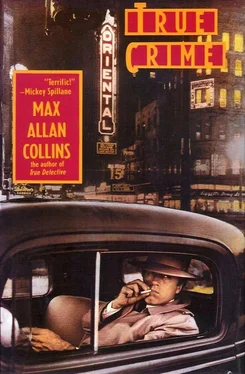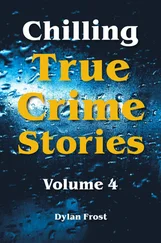I’d used up part of the six hundred-some dollars I’d cleared off the Dillinger fiasco to improve my office. I’d got rid of the patched brown-leather couch and put in a modern one, artificial-leather maroon cushions on the left and right and cream cushions in the middle, sitting on a swooping chrome-tube frame. I’d picked up a matching chair with maroon seat and cream back cushion; it looked like an electric chair out of Buck Rogers, and the couch was like something in the drinking car on the Silver Streak. A little steel smoking stand with an ebony Formica top was to one side of the couch, and in front of it was a steel, ebony-Formica-topped coffee table. The woman at Sears said the stuff was “as modern as tomorrow.” And on sale today.
Sally had helped me pick it out, and her thinking had been to make my office look more like an office, and in the showroom she seemed to make sense — this streamlined modern furniture seemed just the ticket to pull me up into the twentieth century. Today it all seemed silly to me, absurd in the same room as my Murphy bed and scarred old desk and cracked plaster walls.
On a more practical note I’d put in a water cooler, which was humming over against the wall near the washroom. No use carrying that bottle too far to fill it back up. I’d picked it up used from a small import-export business down the hall, that went under a few weeks before. The heat wave had let up a bit but wasn’t exactly gone, and the little paper cups of refrigerated water made life slightly more bearable.
I was filling one of the cups and the water cooler was saying, “Glug glug,” when somebody knocked on my door.
“It’s open,” I said, and drank my water.
The door opened slowly and a thin man of about forty stepped one foot tentatively inside and peeked in around as if looking to see if the coast was clear.
“Mr. Heller?”
“Yes. Can I help you?”
“Might I step in, sir?”
“Certainly.” I gestured with the now-empty paper cup toward the maroon-and-cream, chrome-tube throne I was now providing for clients, opposite my desk.
He came all the way in, a man about my height but twenty pounds lighter; his face was gaunt, weathered, lined with work, with eyes of that odd light blue color like the sky on certain washed-out summer days. He held his straw hat — not a boater — in his hands, and smiled one of those polite smiles that barely qualifies as smiling and nodded as I walked behind my desk and made his way uncertainly toward the chair of tomorrow.
He clearly was a man of yesterday. He slouched a bit — not from the weight of the world, but from something much heavier: he wore a sense of personal tragedy like a topcoat. A snug-fitting one. His clothes didn’t make as close a fit: his dark brown suit wasn’t cheap but wasn’t tailored (like my furniture, it might’ve been gotten at Sears — though in his case surely by mail-order catalog) and shiny brown shoes and his light brown bow tie were obviously Sunday-go-to-meeting clothes, and he was less than comfortable in them. If he’d ever been comfortable in his life.
Certainly he wasn’t in the modern chair; he looked at it suspiciously before sitting, then did, as if he had no choice, like Zangara taking the electric cure. He smiled again — it was just a crease in his face — and patted the ebony armrests atop the tubing at either side of him and said, “Seen some things like this at the Century of Progress last year.”
I ventured a smile. “Nobody said the future was going to be a picnic.”
He tilted his head; it was like a hound dog trying to understand an abstract concept.
“I’m afraid I don’t follow you, sir,” he said.
“Skip it. And let’s skip the ‘sir,’ too — you can put a ‘mister’ in front of the Heller, if you like. Or not. I don’t stand on ceremony.” I ventured another smile. “Not as long as you’re a paying customer.”
His face creased in the sort of smile again, but he still didn’t get my drift. Humor was as foreign to him as the chair he was sitting in.
“Now,” I said, getting a yellow pad and a pencil out of a desk drawer, “if you’ll give me your name and the nature of your business...”
“I’m a farmer. Or used to be.”
I’d meant his business with me, but never mind. He was too young to be retired — despite his lined face, his hair was thick and black with just a salt-and-peppering around his ears. Maybe he wasn’t a paying customer after all.
I said, “Did they foreclose on you?”
“No!” he said, as if offended. Then thinking it over, softened his tone and repeated, “No. Plenty folks I know did get their notice. It’s better, now.”
“Thanks to FDR and Henry Wallace, you mean.”
He rested the hat on my desk, off to one side, near the edge. “No,” he said, flatly. “Just folks sticking together. When the banks were holding farm sales, not so long ago, those of us with any money a’tall would go and bid a nickel for a plow, dime for a horse, quarter for a tractor, and then just give it all back to the real owner, afterwards. We spread word anybody was to bid against us would be dealt with severe. And there’d be a couple hundred of us at the auction, so...”
“But you still have your farm.”
“No. I sold out. Took a loss, but I sold.”
“Excuse me, mister, uh...?”
“Petersen,” he said, rising, stretching his hand across my desk for me to shake, “Joshua Petersen.”
I shook his hand. “Pleased to make your acquaintance, Mr. Petersen.”
He sat back down. “I live in De Kalb, these days. Used to live just outside of there. But now I’m in town. And I took the train this morning to come in here just to see you, Mr. Heller.” Taking the train was clearly a major decision in his life.
“Was I recommended to you?”
He shook his head. “I seen your name in the paper. When they killed Dillinger.”
So — it did pay to advertise. I said, “Why are you here, Mr. Petersen?”
He seemed momentarily confused, as if the answer to that was self-evident.
“Why, Mr. Heller — the only detectives in De Kalb are the police kind. I need somebody private.” He cleared his throat, and formally made his intentions clear: “I come by train seeking the help of a big-city detective.”
I didn’t know whether to laugh or cry. Instead I just scribbled circles with my pencil and asked, “Why are you seeking a detective’s help?”
He leaned forward; there was no self-pity in his gaunt face, just tragedy.
The reason for which was now explained: “My daughter,” he said. “She’s missing.”
“I see.”
“She’d be... nineteen, now.”
“Has she been missing for some time?”
He nodded. Kept nodding as he went on: “Last I knew she was running with a bad crowd.”
“A bad crowd.”
He looked at me with those empty light blue eyes; they were as barren as an unplanted field.
“I better tell you the story,” he said.
He told me the story. At seventeen his daughter Louise had married another farmer, only a few years her father’s junior. Her father, a widower since the girl’s childhood and a rigidly religious man, admitted having been a strict disciplinarian with his only child.
“By that,” I said, “you mean you beat her.”
Nodding, head gazing down, blue empty eyes finally filling with tears, he said, “I make that admission freely.”
“Mr. Petersen, this isn’t a court, and it isn’t church, either. You don’t have to punish yourself, here. And I’m certainly not going to judge you. But you do have to tell me the facts, so I can help you.”
He nodded some more. Said, “No need to punish myself.”
“That’s right.”
“The Lord will take care of that.”
Читать дальше












